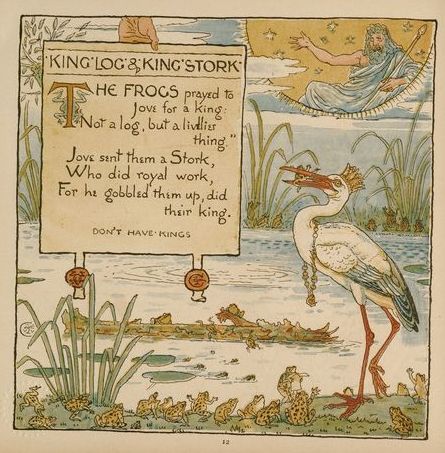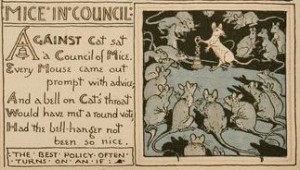…and maybe they’ll go away.
“Court orders Jammie Thomas to pay RIAA $1.92 million”
For sharing 24 songs [earlier]. A range of reactions: Ray Beckerman (believes case is headed for third trial), Max Kennerly (absurdly high damage awards happen more often when jury distrusts truthfulness of defendant), Amy Alkon (“Stealing from really, really rich people is still stealing”), Ron Coleman and more (case should prompt a reexamination of issue of statutory damages).
“Jose Canseco to sue baseball”
The ballplayer has reportedly told Sports Illustrated that he plans to sue Major League Baseball for being unfair to steroids users and for keeping players like him out of the Hall of Fame [NY Daily News, Canadian Press via Krauss/PoL]
CPSIA chronicles, June 18

- As noted earlier, the next all-out debacle on the CPSIA front is expected to result from the law’s tracking and labeling regulations, due to take effect August 14, and for which the CPSC has not yet issued guidance, although product makers ordinarily need to resolve crucial issues of manufacturing (as with etching of lot numbers) and packaging at least many months if not longer in advance of sale. Sharon McLoone at CNNMoney had quite a good report a week ago on this latest crisis, which as of this writing has not been followed up much of anywhere else in the press. This continues the pattern in which 1) most key elements of the ongoing CPSIA disaster get good coverage in at least one (sometimes more) major media outlets; 2) the bigger-picture disaster of the law never quite succeeds in breaking out into general coverage as a national story, in large part because 3) the agenda-setting New York Times never consents (even six months into the story!) to give the matter any coverage at all. For more hints on the approaching tracking-label train wreck, see this op-ed by a South Carolina maker of school supplies (“Companies such as ours are now forced to guess about their new legal requirements. … My company may have to change labels hundreds of times a week in our two factories. The investment necessary to handle this new rule alone is crippling.”), or the comments of appliquéd bib maker Laurel Schreiber of Lucy’s Pocket (if the testing doesn’t get her, the tracking labels will), or of New Jersey wooden toy maker John Greco (advised that tracking info would add $3.50 to $5.00 to cost of making $10 handmade toy). And here’s a view from the home furnishings business.
- No, the menace to pre-1985 children’s books has not gone away, not in the least. Librarians and publishers remain on the edge of their seats awaiting exemptions, clarifications or both. There was some good coverage last month in the Sioux Falls Business Journal (store owner Jenny Cook “had to throw out only 30 books at her store to comply” because most were newer; “Siouxland Libraries has pulled a list of books that were published before 1985”) and at Syracuse.com (“When you think through the implications, it means closing our libraries to children”). And in a sign of possible things to come, ABC-affiliated stations in Seattle and Washington, D.C. have now run sensationalist “toxic books!” attacks on local libraries [Common Room, ShopFloor] More: Winifred Maker, Anderson Valley Post (April).
- The CPSC’s stay of enforcement didn’t really solve the problem of the ban on dirtbikes and mini-ATVs, and responsible users and dealers end up getting the short end of the stick [Jason Giacchino/ATVSource, Vince Castellanos/ESPN FMX, Motorcycle Industry Council, Charleston (S.C.) Post and Courier]
- Downtown Los Angeles is home to an estimated 500 toy companies — most of them far smaller than crosstown giant Mattel — and they’re in much distress from the law. [Alexa Hyland, L.A. Business Journal] The L.A. Times, which once gave serious scrutiny to the law’s effects on the apparel and resale sectors, seems (scroll) to be dropping the ball.
- Those who remain in the kids’-product business after coping with all the other parts of the law will also want to educate themselves about “recall escrows” [Rick Woldenberg]
- Inez Tenenbaum, named by Obama as new CPSC chair, had her confirmation hearing on Tuesday [ShopFloor and more, Rick Woldenberg]. Nancy Nord earlier stepped down from her role as acting chair.
- What, what, what could they have been thinking? The American Library Association has actually given its 2009 Public Service Award to California Senator Barbara Boxer, a key architect of some of CPSIA’s provisions; the retroactive phthalates ban she championed has been especially effective in forcing “books-plus” off library shelves, and she has turned a coldly unsympathetic ear to cries of distress over the law (via @melanes). To repeat: what could the ALA have been thinking?

Public domain images courtesy ChildrensLibrary.org: Walter Crane, illustrator, The Baby’s Aesop (1887).
Oh pshaw
A century-old New Jersey law bans parents’ habitual use of profane or indecent language around kids [Eugene Volokh and followup]
Social media reminders
Haven’t promoted it in a while, but Overlawyered has its Facebook fan page. Find out who else is a fan! And the Manhattan Institute for Policy Research, with which I’m affiliated, has just launched its own fan page here.
While we’re at it, remember that if you’re on Twitter, you can follow Overlawyered (featuring sporadic original material as well as a feed of new posts), Point of Law (ditto), and my own personal account.
Also while we’re on the subject, please take a moment to add Overlawyered to your RSS reader if you haven’t already.
“Lawyer for Holocaust Victims Claims Trust-Fund Dipping Was Inadvertent”
Longtime Overlawyered mentionee Edward Fagan, already removed from practice in New York, now fights disbarment in New Jersey.
“Tourism Bill to Be Combined With Anti-Civil-Liberties Hate Crimes Bill”
Tourism bill? [Hans Bader, Examiner; more on hate crimes legislation; Bader followup on U.S. Civil Rights Commission’s opposition to bill]
Massachusetts’s long tax arm
The state is suing the Town Fair Tire chain, saying its outlets in New Hampshire (a state with no sales tax) should have collected tax on Massachusetts residents’ purchases and sent it off to Boston on their behalf. It was supposed to know which customers these were by checking their cars’ license plates. [Daniel J. Flynn, City Journal] More: TaxProf covered the suit in February.
Everything in proportion (U.K. law enforcement edition)
The Guardian: “Thousands of people are being stopped and searched by the police under counter-terrorism powers simply to provide a racial balance in official statistics, the government’s official anti-terror law watchdog has revealed.” (via Jesse Walker, Reason “Hit and Run”). More: Patrick at Popehat.
